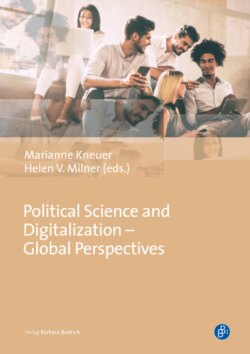Читать книгу Political Science and Digitalization - Global Perspectives - Группа авторов - Страница 20
На сайте Литреса книга снята с продажи.
Annotations
Оглавление1 I would like to thank the comments and revisions from the editors, as well as Miguel Centellas and Xenia Ariñez.
2 This section is based on previous research where the history of the discipline is described from its teaching programs, its research mainly in journals, and its networks (Ascarrunz 2017).
3 This is important since Universidad de la Cordillera and UCB have presence in other departments of Bolivia.
4 In the case of Bolivian political science, this is important because most of the professors hired by universities do not have full time contracts, therefore academic activity is sometimes restricted to teaching and not researching as well.
5 The information regarding the journal Ciencias Políticas, from UCB, is out of the analysis made by Ascarrunz (2017).
6 This experience will be deepened in the section of the digital revolution.
7 Even though it’s national, it has its base in La Paz.
8 Reported as closed, because of politics inside the University (Ascarrunz, 2017)
9 Despite the significant conceptual differences among digital era, digital revolution, and information society (see Rojas, 2010; CEPAL, 2016; Rendón-Rojas, 2001), this paper seizes their common denominator of use of technological developments (especially regarding information and communications).
10 The first five universities considered are the ones that have their curricula posted on-line and available for public. The second three are the ones based in La Paz city, which made it easier to gather information, both by experience and shallow interviews. Interviews to other universities’ staff were tried by e-mail or other digital communication, but no answer was received.
11 This information was provided by a group of six students from the university.
12 Those subjects can be found at UMSA, UMSS, and UCB.
13 Revisions of programs, theses, journals, and books was carried out until june 2018.
14 This information is only available online for this university; the other seven political science programs don’t make their final grade researches (for example, theses) available so easily.
15 In curricular content, UMSA has leaded the panorama in Bolivia regarding the direction of political science. For example, during the first stages with Marxism predominance (Bueno & Torrico 2015), this university was the first to try to balance with other theoretical approaches; the same happened regarding the dependence of the discipline especially from Law.
16 Like the other publications, the other two journals, Conocimiento i Política (UAGRM) and Estudios Políticos (UMSS), don’t have any information for digital consultation, and being in different cities made it harder to get the data from these. Although an e-mail or social network query was made, the information wasn’t provided.
17 The first two issues had State Theory as main topic, although, overall, the papers go from democracy, State, and nation to the role of political scientists in labor market.
18 In this recount, two issues are missing, one from each era. This is due to lack of information at the library of the political science department.
